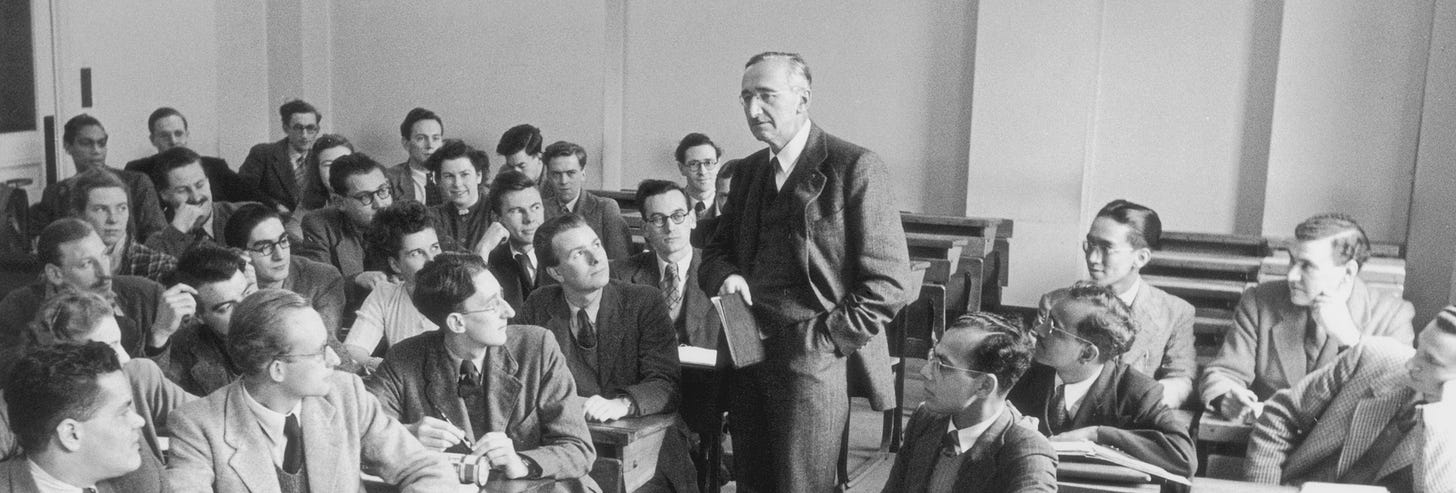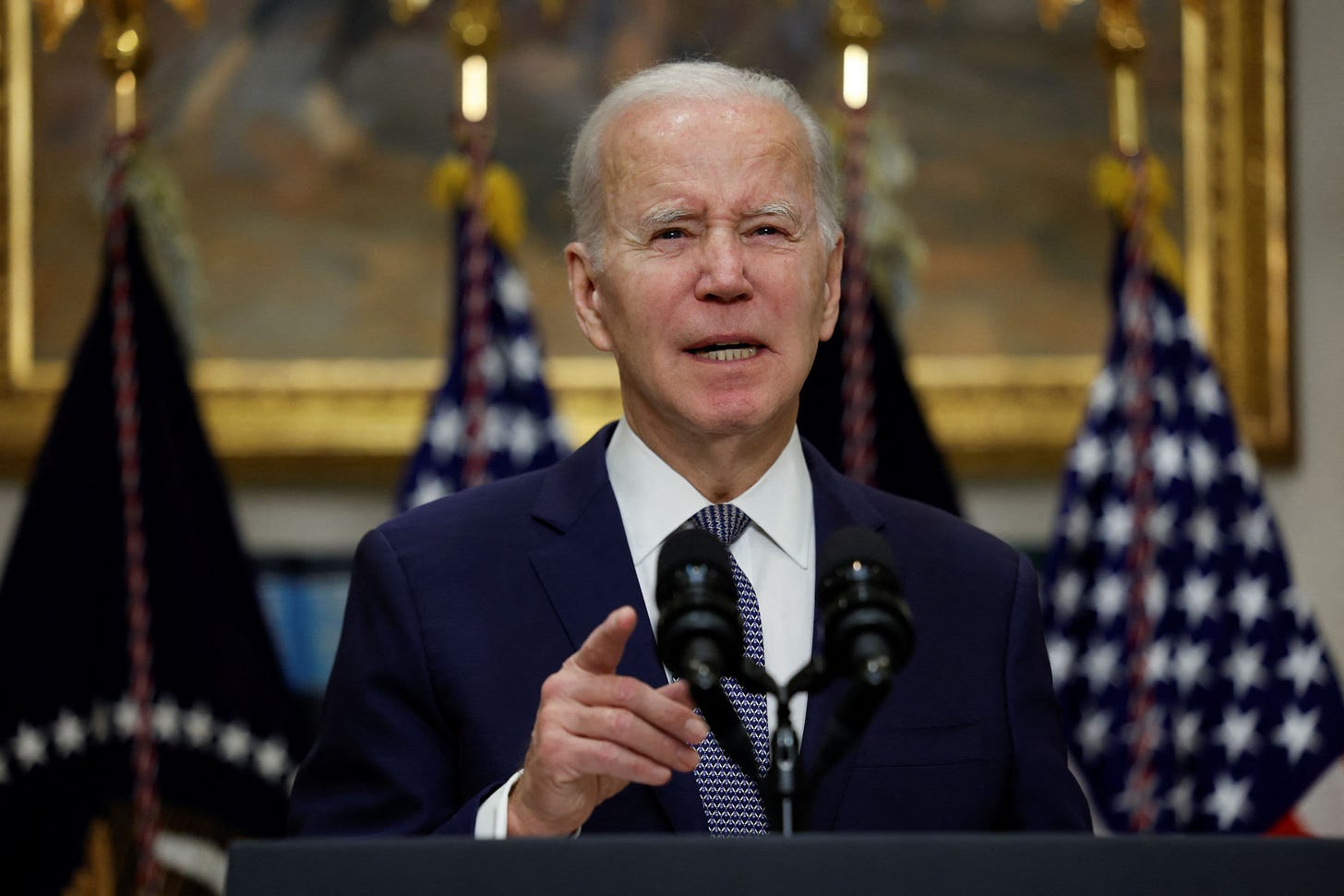Policymaker Ignorance and Social Crises
The political epistemology of doing something versus doing nothing
One of the benefits of relatively liberal governments – in the classical or, if you must, “libertarian” sense of liberal – would seem to be the narrower scope they allow for policymaker ignorance to wreak havoc on the consequences of policy decisions as compared to less liberal governments. This is a simple reflection of the fact that liberal governments tend to assign the realization of relatively fewer and / or less challenging goals to the public actions of policymakers. Indeed, it is almost part of the definition of liberalism that policymakers take on fewer and / or simpler tasks in liberal governments. It is undoubtedly part of the definition of totalitarianism – it is the very meaning of the word “total” in “totalitarianism” – that policymakers take on all or nearly all tasks in totalitarian systems. Understood in this way, it is almost tautological that relatively liberal governments afford comparatively less scope for the deleterious consequences of policymaker ignorance.
It does not follow from this general truth, however, that, in some particular instance, with regard to some particular social problem or crisis, the libertarian’s typical laissez-faire response – “Hands off! Do nothing!” – is more appropriate from the perspective of the problem of policymaker ignorance than the “Help us! Do something!” policy response typically preferred by others, progressives and technocrats (to repeat myself), in particular. Doing nothing in response to a social problem can be just as, if not more, epistemically burdensome as doing something.
Successful deliberate action, which is to say, action that achieves its goals, whatever they might be, without the intervention of spontaneous forces, is knowledge dependent.
To deliberately realize a goal, the actor needs an adequate theory, an explanation of how the world (or that slice of it relevant to the goal) works in general. The actor also needs sufficient data that can be plugged into the given theory to produce an accurate prediction about how the world will respond when the actor acts to realize the goal. This theoretical knowledge and empirical data together constitute the actor’s propositional knowledge, or knowledge-that.
In addition to knowledge-that, the actor needs non-propositional knowledge-how or, more colloquially, “know-how,” i.e., the ability to manipulate the world in a way that suffices to bring about the goal as predicted by the actor’s knowledge-that.
Everyone, even an ignorant policymaker, knows how to stay put. The know-how required to do nothing, to stay put, would seem to be automatically given to all, even the most peripatetic and garrulous.
Doing nothing may have no end but to “let the (potato) chips fall where they may.” In adopting a do-nothing policy, an actor may have no particular goal in mind. When doing nothing is not a means to a particular end, it bears no epistemic burden beyond the easily surmountable one of staying put.
However, a do-nothing policy may instead be adopted as a means of realizing some goal. To the extent that inaction is adopted as a means of achieving some policy end, the propositional knowledge required to do nothing effectively, as a means of achieving the given end, may be considerable.
When, for example, on October 19, 1932, F. A. Hayek, Lionel Robbins, and other members of the faculty of economics at the London School of Economics wrote in the pages of the Financial Times against public works and state investment programs during the Great Depression, they did not mean that the chips should be allowed to fall where they may. They recommended a do-nothing policy as a better means of growing the economy and promoting a return to economic equilibrium, as a better method of raising the world economy out of its depressed state, than government intervention.
To deliberately realize this goal via the LSE economists’ do-nothing policy, relevant policymakers would have needed an adequate theory of the operation of the economy’s spontaneous forces and empirical knowledge that the depressed economic circumstances prevailing at the time conduced to the realization of the goal via policy inaction. It could not have been determined a priori, and should not have been assumed by anyone, that such a do-nothing policy was less epistemically burdensome to relevant policymakers than the interventionist do-something alternative. From the mere fact that they obviously knew how to do nothing, it does not necessarily follow that the balance of policymakers’ knowledge, all things considered, told in favor of doing nothing instead of something.
It is well to note, moreover, that many do-nothing policies, inasmuch as their success requires the deliberate elimination of obstacles to the effective operation of spontaneous forces, might require policymakers to do quite a lot. There can be a significant epistemic difference between a pure do-nothing policy and a do-nothing-but-remove-obstacles policy. The latter, but not the former, requires policymakers to know which obstacles to remove and how to remove them to promote the effective functioning of relevant spontaneous forces. There is at best a difference in degree, not a difference in kind, between establishing new social institutions or enacting new pieces of legislation, and removing obstacles hindering the operation of spontaneity. Both can involve epistemic burdens that policymakers may struggle to surmount.
Explaining policymakers’ apparent (but no more than apparent) preference for do-something policies
Were it the case that doing nothing was always less epistemically burdensome than doing something, we would expect to observe more policy inaction than we do. The major implication of the analysis of the effects of ignorance on decision-making is that there is a systematic tendency for decision-makers to prefer relatively less epistemically burdensome options. Other things equal, persons tend to prefer the epistemically easy to the epistemically difficult. Applied to policymakers, this suggests that, were policy inaction really the universally easier option, we would see more of it than policy action.
However, what we actually observe appears to be just the opposite. Policymakers seem to have an almost inborn preference for action over inaction, for doing something rather than doing nothing.
It would appear, then, that policymakers typically tend to evaluate do-somethingism as less epistemically burdensome, other things equal, than do-nothingism.
This is a hard pill to swallow, however. Though it is true that we shouldn’t assume the relative epistemic ease of doing nothing a priori, it nevertheless seems like policy inaction should generally tend to be epistemically easier than policy action. If policymakers evaluated their relevant epistemic circumstances at all accurately, they would prefer doing something to doing nothing far less frequently than they (seem to) do. The evidence that policymakers tend to prefer doing something to doing nothing seems to be in some tension with the major implication of the problem of policymaker ignorance according to which policymakers prefer the relatively epistemically easy to the more epistemically burdensome.
I want to suggest that this apparent tension is no more than merely apparent. In fact, there are two explanations of this evidence that are consistent with the analysis of the problem of policymaker ignorance.
First, policymakers may not be evaluating their epistemic circumstances with much accuracy. Unwarranted arrogance and misplaced hubris may be at work. Policymakers might chronically overestimate their relevant knowledge and abilities regarding do-something policies. Practically encouraged from birth to believe that they are special, that they are uniquely knowledgeable, relative to the comparatively common constituents on whose behalf they allegedly make policies, policymakers might come to believe their own mythologies.
Policymakers might suffer, in other words, from a pretence of knowledge, from unknown unknowns, about do-something policies. In fact, they don’t possess the knowledge required to do something effectively, but they don’t know that they don’t know; they mistakenly believe that they do possess this knowledge and, so, face greater incentives, other things equal, to do something instead of nothing than they would confront if they correctly evaluated their, in fact, deficient epistemic circumstances.
Second, other things are far from equal, ceteris is definitely not paribus, when it comes to the benefits policymakers can expect to accrue from doing something rather than doing nothing to address a social crisis. Indeed, so appreciative of policy assistance do constituents tend to be during a crisis that policymakers’ efforts need not even be very effective. The benefits that redound to policymakers who are thought by their constituents to be doing something are extensive compared to the costs incurred by policymakers who constituents judge to be doing nothing in response to a crisis.
The policymakers’ problem, in other words, is not whether to do something rather than nothing in response to a crisis, but how to both garner the benefits of seeming to do something and avoid the costs of seeming to do nothing.
The problem of policymaker ignorance implies that policymakers will try to realize this goal in the least epistemically burdensome way. It is typically, if not always, less epistemically burdensome to pretend to do something than to actually do something. It is generally epistemically easier to make a shallow and superficial effort than a thoughtful and serious attempt to do something.
This suggests that, when we see policymakers ostensibly doing something in response to a crisis, what we are really seeing is political theater, shallow and superficial rather than thoughtful and serious attempts to do something to address the crisis.
In many contexts, the all-things-considered best option for a policymaker might combine the generally lower epistemic burden of doing nothing with the considerable benefits of being judged by constituents to be doing something to respond to the given crisis. The best option for policymakers who judge that they know enough to do nothing, but not enough to do something, will often be to pretend to do something while really doing nothing.
This is all the easier in modern media environments, where it is relatively convenient for policymakers to broadcast their constituent-mindedness without doing anything very substantive to address constituents’ interests and concerns. There seems to be a systematic bias in contemporary politics in favor of pretending to do something, a policy that combines the typically lighter epistemic burden of doing nothing with the significant benefits of public approval.
Of course, these explanations are not mutually exclusive. It may be that some policymakers prefer to (seem to) do something because they overestimate their relevant knowledge, are ignorant of their relevant ignorance, and pretend to knowledge adequate to do something effectively, while other policymakers prefer to seem to do something because they are alive to the relative benefits of seeming to do something rather than nothing.
I leave it as an exercise for the reader to consider policymakers’ actions this week in response to the Silicon Valley Bank failure in the light of this analysis.







